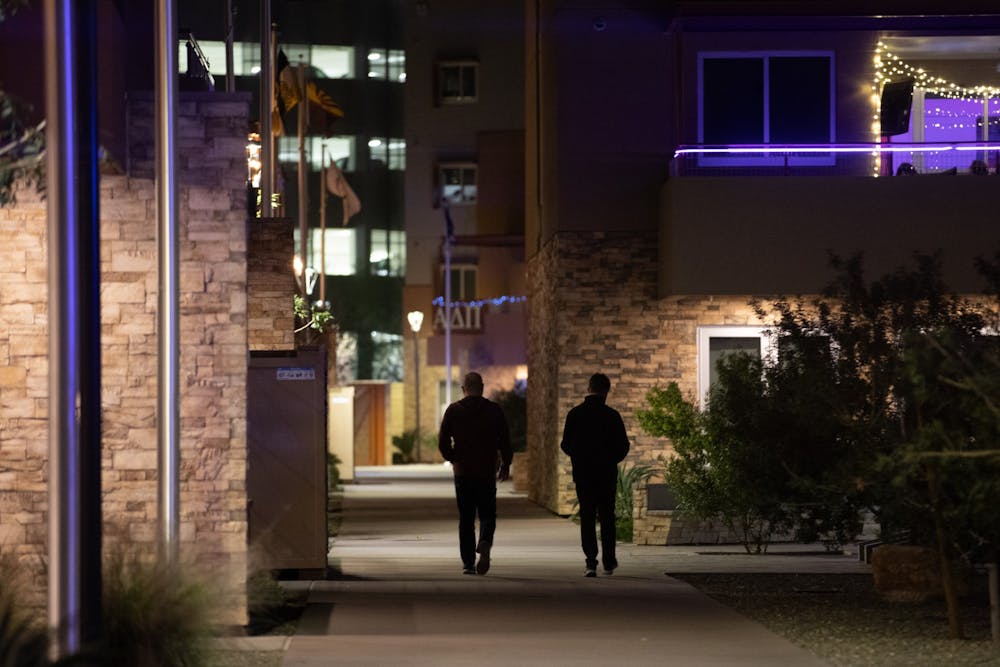Greek Life remains an infamous yet elusive community that thousands of U.S. college students are part of, with sororities and fraternities being at the center of many conversations on campus. ASU is home to over 70 Greek-lettered organizations, ranging from business fraternities to well-known sororities like Alpha Phi and Chi Omega.
An exploration of this community reveals a few negative implications: Greek Life exhibits an exclusivity and inaccessibility that results in heightened classism and misogyny. Despite measures in place to fix these issues, they are insufficient. ASU Greek Life should incorporate increased financial assistance, diversity trainings and demographic reports into its organizations to combat these issues.
Being in Greek Life is not cheap. New Panhellenic Association sorority members can pay up to $1,300 in dues, and member chapter dues are up to $890, according to ASU's 2022-23 Greek Life Guide Book. While this cost is on the lower end of the national range (for instance, University of Alabama sorority members can pay more than double that), it is still a hefty charge for a school organization.
Former Delta Zeta member Parker Goodman, a senior studying early childhood and early childhood special education, said the financial obstacles she faced while in Greek Life were a primary contributing factor to her withdrawal from the program this past year.
"If I was to miss 'work week,' I would be fined anywhere from $600 to $1,000. They did not accept work as an excuse, which I think is unfair for girls who pay their own rent and own expenses," Goodman said.
These excessive monetary dues can lead to exclusion of lower-income students, upholding values of classism. In 2013, research on 213,160 undergraduate students across nine large public universities from the Association of Fraternity/Sorority Advisors showed significant disparities in chapter house residencies among social classes. The study found 51.5% of those residing in Greek Life housing being upper-middle or professional class, while 33.6% were middle-class students. Low-income students accounted for an abysmal 1.7% of chapter house residencies.
Sorority and fraternity dues — and in essence Greek Life itself — systemically exclude students of lower socioeconomic statuses, increasing homogeneity in class and other intersectional demographics, like race.
Many universities, including ASU, do not complete demographic reports of members of Greek Life on their campuses. While secrecy is a prevalent facet of Greek society, it is no secret that this community cultivates an experience that is uninviting to those who are not wealthy and white.
Along with the issues sororities and fraternities pose in regards to race and class, Greek society contributes to sexism and misogyny on campus. This is particularly apparent when looking at the differences between sororities and fraternities.
Sarah Simpson, a Chi Omega member, Greek Life leader and senior studying public health, discussed both the positives and negatives that come with being in a sorority, addressing how sexism may play a role in ASU Greek Life.
“Sororities are held to a higher standard of acting the right way and presenting yourself in a certain way, whereas fraternities can throw parties, openly drink and act in a different way," Simpson said. "While we all have the 'same rules' that we need to follow, they have more leniency, and if a sorority and fraternity were to break the same rule, (fraternities) have less consequences."
Sororities being held to higher standards than fraternities seems to be a common theme in Greek Life, as Goodman spoke on the matter as well, describing rush week for the two as "polar opposites."
"For girls, it's extremely formal, takes about seven to 10 hours, and you are not allowed to speak on certain topics. For the boys, they host casual events for one to two hours and have no rules and regulations for what they can and cannot speak about," Goodman said.
Women members of Greek Life being met with stricter rule enforcement than men emphasizes the control of women within a patriarchal society. However, there is also the problem of inherently misogynistic values or guidelines sororities themselves are expected to abide by.
Both Simpson and Goodman discussed how sorority members are held to certain standards in regards to their physical appearance, whether it be makeup and hair requirements while wearing their letters or social media requirements to represent what the sororities want them to.
Simpson explained the week-long “bid process” in which women rank the sororities they like the most to the ones they like the least and, conversely, sororities rank the women they like the most to the ones they like the least. She said that if she could, she would change “how superficial it is.”
Although superficiality is reason enough to encourage change in these processes, ranking girls in this way seems to contribute to misogyny, as these rankings are only based upon a week’s worth of limited interactions, prompting a strange sense of competition among women on campus. A program with a genuine sense of "sisterhood" would not place certain women at higher values than others.
Goodman shares similar concerns to Simpson's as far as superficiality. Although she had a positive first-year experience, things seemed to shift as her sorority took on new member classes.
"It became obvious to me that a lot of these girls were not there to make new friends or to be supportive of new members joining," she said.
While there are positive aspects of Greek Life that focus on building kinship and charity, oftentimes negative values are centered instead. ASU Greek Life should consider modifying certain aspects of the culture to make it more inclusive and safe for its students. Increased financial aid options, hosting more diversity trainings and holding the same expectations for sororities and fraternities can help mitigate the classism and misogyny embedded within the organization.
Edited by Sadie Buggle, Logan Stanley, Sophia Balasubramanian and Greta Forslund.
Reach the columnist at haleighbell1026@gmail.com and follow @wwoodengirl on Twitter.
Editor's note: The opinions presented in this column are the author's and do not imply any endorsement from The State Press or its editors.
Want to join the conversation? Send an email to opiniondesk.statepress@gmail.com. Keep letters under 500 words and be sure to include your university affiliation. Anonymity will not be granted.
Like The State Press on Facebook and follow @statepress on Twitter.




